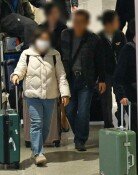For or against Korean reunification?
For or against Korean reunification?
Posted December. 28, 2010 10:08,
South Korea is changing its policy direction for reunification of the Korean Peninsula, something which had been based on a phased plan, following North Koreas Nov. 23 shelling of Yeonpyeong Island. Referring to Pyongyang, President Lee Myung-bak recently said, No force in history has resisted change by the people. I feel that the two Koreas will reunify in the not-so-distant future. His comments not only indicate signs of change inside North Korea, which is ruled by the tyrannical Kim Jong Il, but are also an expression of his wish to see a shift of Pyongyangs undemocratic and dictatorial system into a government that assures basic human rights.
Seouls Unification Ministry is reportedly working on a plan for next year by focusing on preparation for righteous national reunification. Rather than passively waiting for change in the North, the ministry apparently intends to proactively seek change within the communist regime. The ministrys 2008 budget set under the left-leaning Roh Moo-hyun administration and that for next year differ significantly in nature and content. Budget for gathering intelligence and information on and analyzing trends in the North jumped 1,984 percent from some 500 million won (430,000 U.S. dollars) to 11.7 billion won (10 million dollars) over the period. Budget for assisting North Korean defectors also rose 96 percent from 60.3 billion won (52 million dollars) to 118.4 billion won (100 million dollars). The ministry is also devising measures to mobilize reunification costs and collaborate with neighboring countries in preparing for reunification.
The situation in North Korea is also unusual due to Kims failing health, his peoples objection to the third-generation power succession of the ruling Kim family, and severe economic hardship. So South Korea should prepare for a sudden change in the North. For Seoul to fundamentally tackle Pyongyangs nuclear weapons development and assure genuine peace, it must proactively pursue a policy that can help advance reunification. Park Se-il, chairman of the Hansun Foundation for Freedom and Happiness, said, Peace in a divided Korean Peninsula is not a genuine peace but a disguised peace, adding, Unification is a prerequisite for (South) Korea to assure genuine peace on the Korean Peninsula and for the peninsula in its entirety to leap forward as an advanced nation.
Progressive groups have also mentioned unification through absorption (of North Korea), a term which had been effectively taboo. Kim Keun-shik, a political science professor at Kyungnam University, said, As a practical measure for Korean reunification, we must consider reunification through South Koreas absorption of North Korea by reflecting the imbalance of power between both sides. German reunification in 1990 was also via absorption based on West Germanys superiority.
Nevertheless, Park Jie-won, the floor leader of South Koreas main opposition Democratic Party, said, (Seoul) should not discuss North Koreas sudden collapse or reunification through absorption of the North. This suggests that left-leaning pro-North Korea groups, which have repeatedly called reunification their cherished wish, want anything but early reunification based on freedom and democracy. So do these groups seek reunification via the integration of the Souths free democracy with the Norths dictatorial and monarchial system? Or do they want the two Koreas to reunify under the dynastic system of the late North Korean founder Kim Il Sung?
Followers of the sunshine policy of engaging the North claim that inter-Korean exchanges and cooperation are the most ideal way toward reunification. Yet "prioritizing cooperation" with Pyongyang, which has repeatedly and openly threatened a "nuclear disaster" to its fellow Koreans while developing nuclear weapons and constantly denying reform, opening and democratization, is effectively a crime that helps maintain an inhumane regime. If the forces that helped the communist regime consolidate itself through conditional provision of aid under the sunshine policy support power succession from Kim Jong Il to his son Jong Un, let alone reflecting on their own mistakes, reunification toward a free democracy will become all the more difficult. Yeom Don-jae, a former diplomat based in Germany and now dean of the Graduate School of Strategic Studies at Sungkyunkwan University in Seoul, witnessed the process of German reunification firsthand. In 1993 under the progressive Kim Dae-jung administration of South Korea, Yeom said, The critical factor in German reunification was West Germanys proactive reunification policy based on supremacy in power rather than its policy of advancing toward East Germany based on exchange and cooperation.







